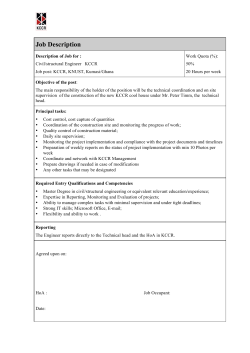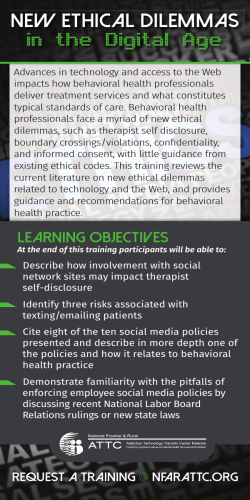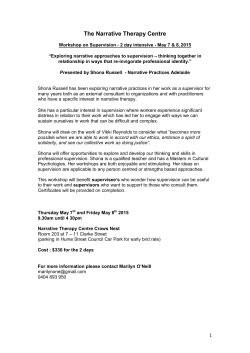
What is clinical supervision? Why so important in your new role?
What is clinical supervision? Why so important in your new role? Natalie Healey CNC State MH and D&A SCC Coordinator ISO 9001 Lic QEC22546 SAI Global What is clinical supervision? • ‘Clinical supervision provides time out and an opportunity, in the context of an ongoing professional relationship with an experienced practitioner, to engage in guided reflection on current practice in ways designed to develop and enhance that practice in the future’ (Open University, 1998) What is clinical supervision? Key elements: • Time • Ongoing > Regular scheduled meetings • Experienced practitioner + trained clinical supervisor • Practice focused • Guided reflection • Goal to enhance practice Objective of clinical supervision To maintain, support and develop a clinician’s competent professional functioning and well being while safe guarding clients care How? • Find an experienced practitioner who is trained in clinical supervision: similar area/field, mentor/aspire to, match your needs to their skills and expertise, ask around • Agreed time – fortnightly/monthly; group/individual • Set goals for clinical supervision eg case presentations, incident mx, clinical guidelines • Contract / be responsible for your own learning • Review & evaluate at agreed intervals • Cost: to organisation / self Why is supervision necessary? • Maintains and promotes standards of care • Practice-focused professional relationship • Clinician reflects upon practice which is guided by a skilled supervisor • Provides an opportunity for the clinician to reflect an any aspect of their clinical work which concerns them Goals • To develop the clinicians own style, expertise and confidence • To enhance skills and knowledge • To encourage the practitioner to think beyond the current way they are working • To provide a ‘neutral’ perspective of what is being presented in supervision • To safe guard a clients care Why? • • • • • Self care Support system Evaluate, reflect and develop clinical practice Reflective practice Registration and professional requirements My personal story: Why I endorse it Jenny • Clinical supervision monthly when working as a clinician guided towards evidenced based practice, research and implementation of quality programs for patients – my well being and contributions to service provision • Mentorship for career pathway to CNC/Management/Academia • Greater understanding of Local, State and National policies • Rolled out clinical supervision at large AHS Why you need to consider it New position > support during implementation and transition of skills and knowledge / project management Identify CPD needs Chronic care patients are complex: physical health, mental health, D&A, social aspects Multiple services – health system ‘frustration’ / reforms Change management Cultural aspects to care Sad stories which can trigger responses Evidenced based practice Reduce isolation Maintain well being Final note “The British miners in the 1920’s fought for what was termed ‘pit-head’ time – the right to wash off the grime of the work in the boss’s time rather than take it home with them. Supervision is the equivalent for those who work at the coal face of personal distress, disease and fragmentation” (Hawkins & Shohet, 2000) References Christine Senediak, NSW Institute of Psychiatry Butterworth Falender & Shafranske Contact Natalie Healey Ph: (02) 9239 2900 Mob: 0410 611 883 nataliehealey@gpnsw.com.au
© Copyright 2025





















